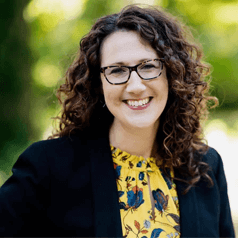
Dr. Krista Longtin is an Assistant Dean for Faculty Affairs and Professional Development at the Indiana University School of Medicine, where she leads health communication training programs for over 4,000 faculty, medical students, residents, and graduate students. Dr. Longtin holds a dual appointment as an associate professor both in the departments of Obstetrics and Gynecology and Communication Studies at IUPUI. Her research focuses on communication education and faculty development in the sciences and health professions. Dr. Longtin serves as the co-editor for the Public Library of Science’s Science Communication blog and leads a graduate minor in Communicating Science at IUPUI. She has served as a consultant on communication and education projects for national and international organizations including the Indiana State Department of Health and the European Science Media Hub.
In 2016, Dr. Longtin was highlighted by the Indianapolis Business Journal as one of their Forty Under 40 young professionals to watch for her work using improvisational theatre to teach physicians and scientists to communicate more effectively. Prior to earning her graduate degrees, Dr. Longtin worked for Indiana Public Radio and The Weather Channel. She keeps her broadcaster voice alive by serving as the co-host of “Intersections,” a weekly public radio show where art and science meet.
Dr. Longtin is not a native Hoosier, but she did the tour of Indiana schools, earning a bachelor’s degree from Ball State University, a master’s from Purdue University, and a PhD from Indiana University. An award-winning educator and researcher, Dr. Longtin’s work has been published in Communication Education, Academic Medicine, and the Journal of Faculty Development.
In her free time, Dr. Longtin enjoys exercising on the Monon Trail, seeing concerts at the Hi-Fi in Fountain Square, or watching indie movies at the Kan-Kan on the Near East Side of Indianapolis.

I’m proud to have worked with multiple community organizations to improve science and health communication.
Dr. Krista Longtin
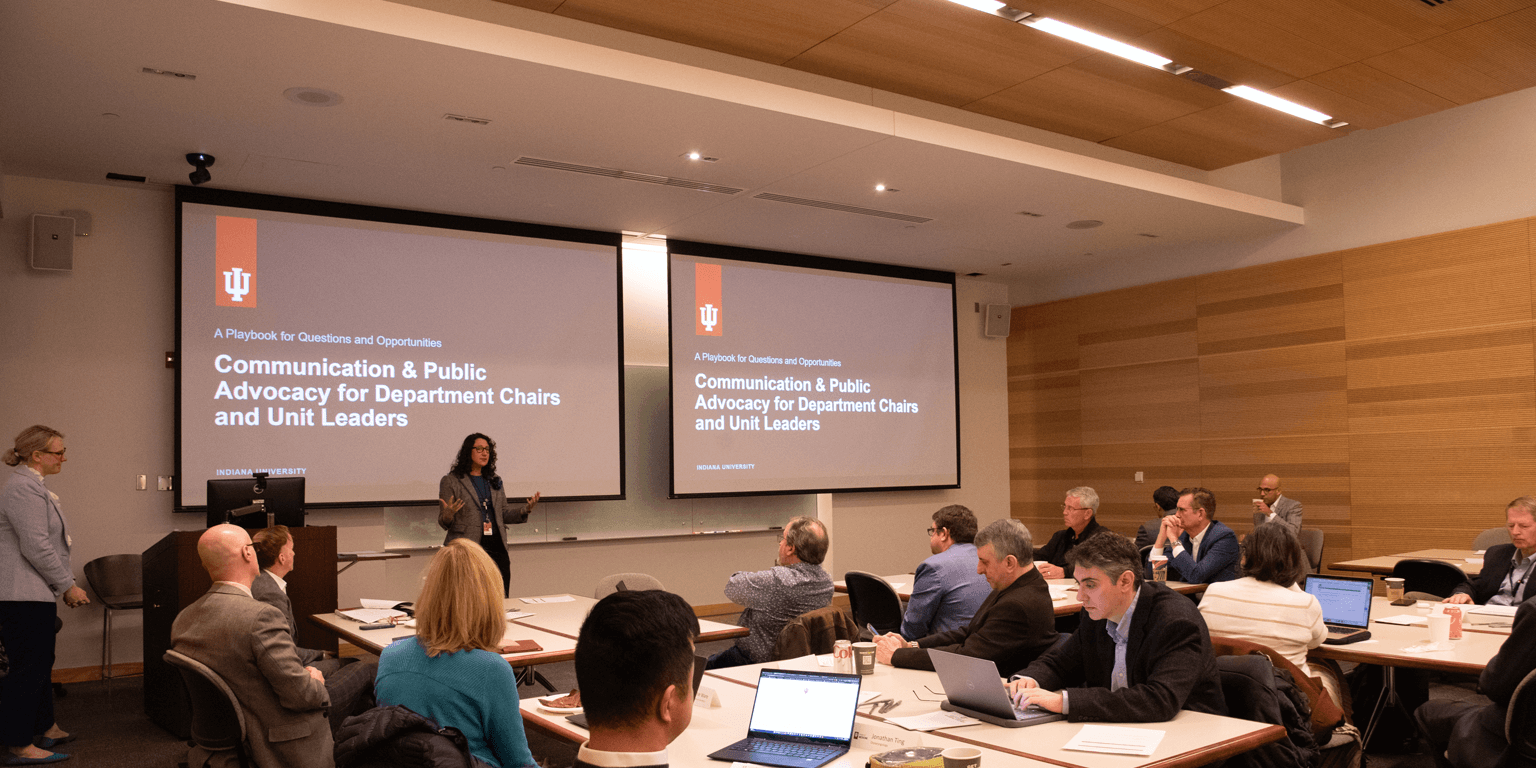
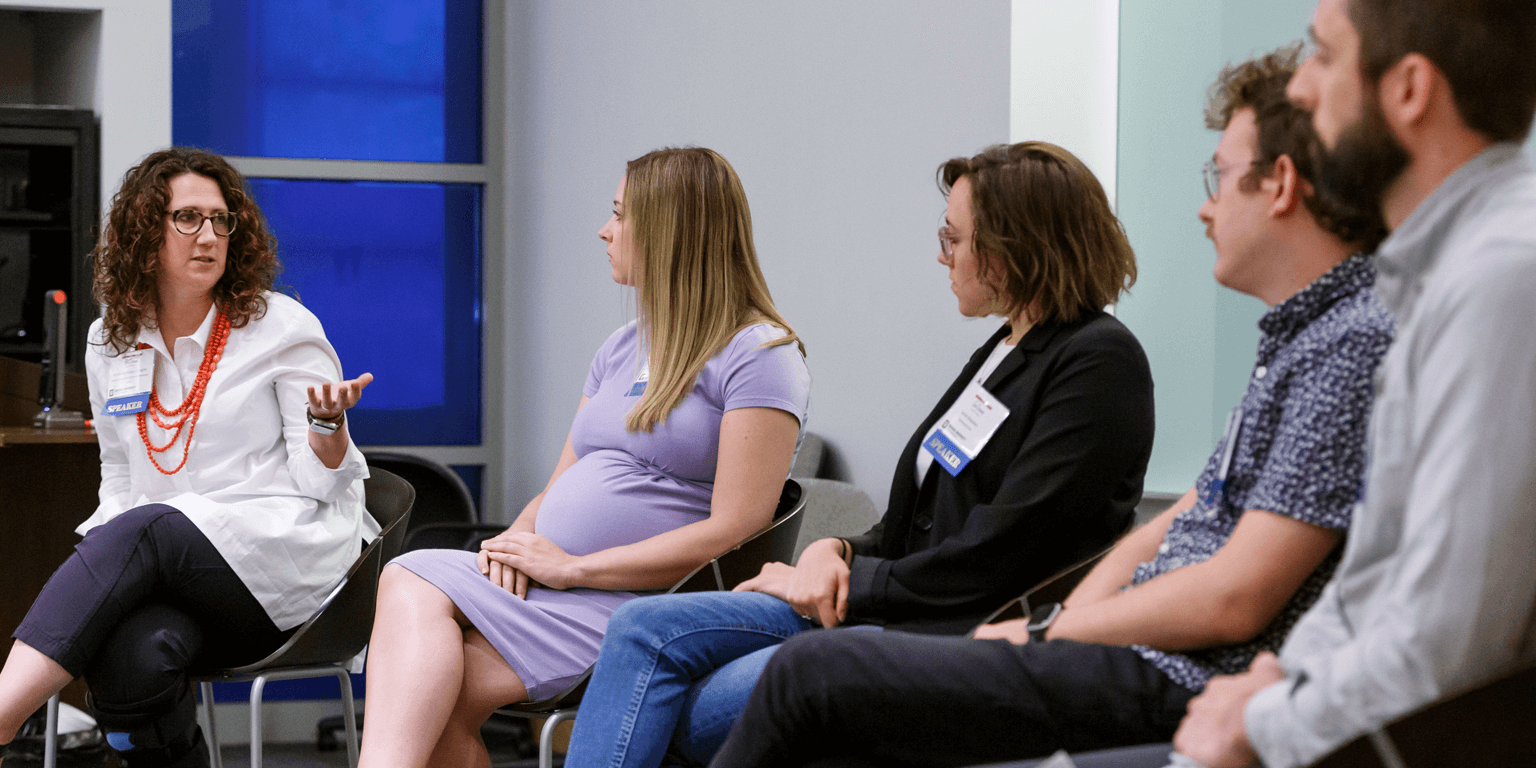
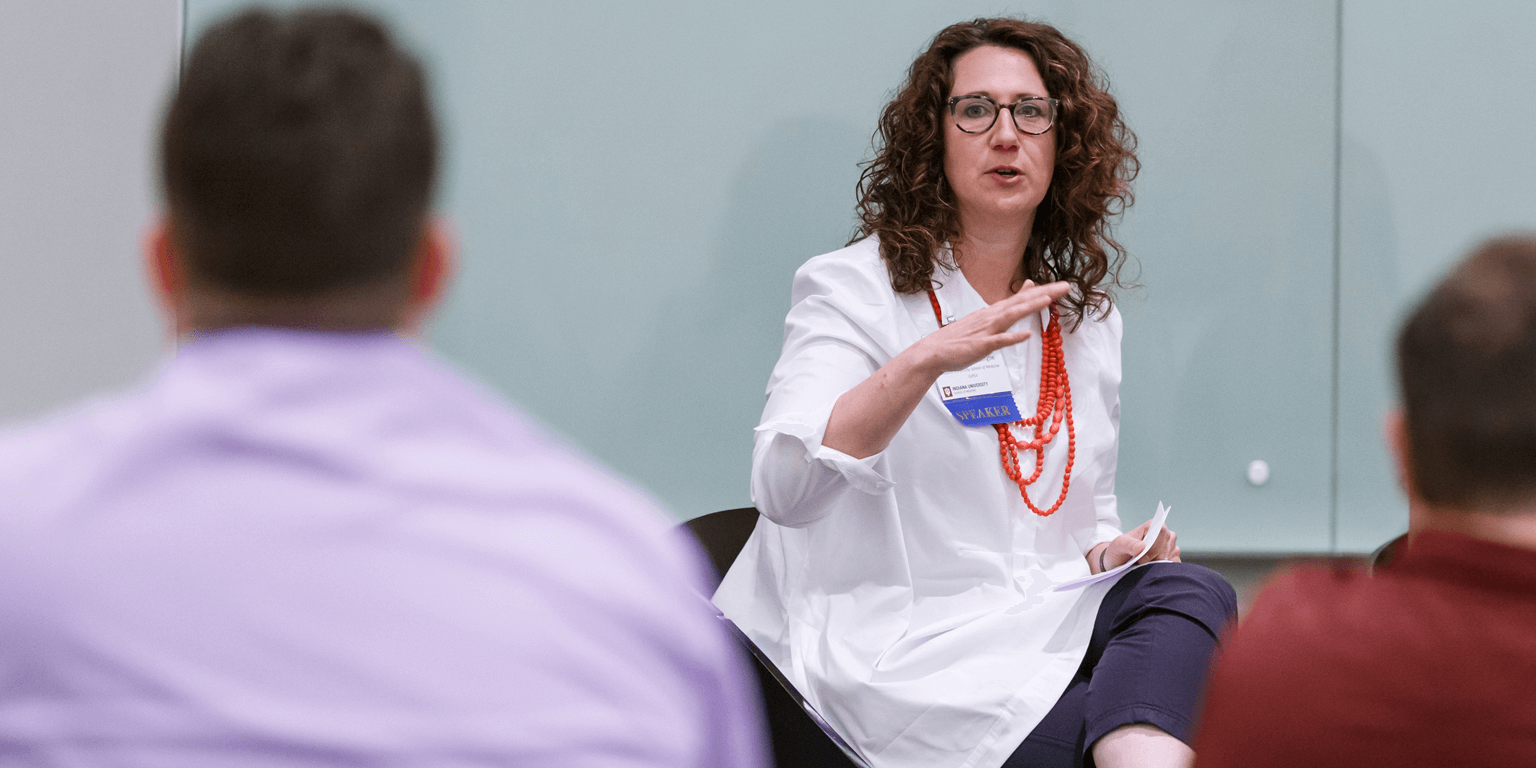
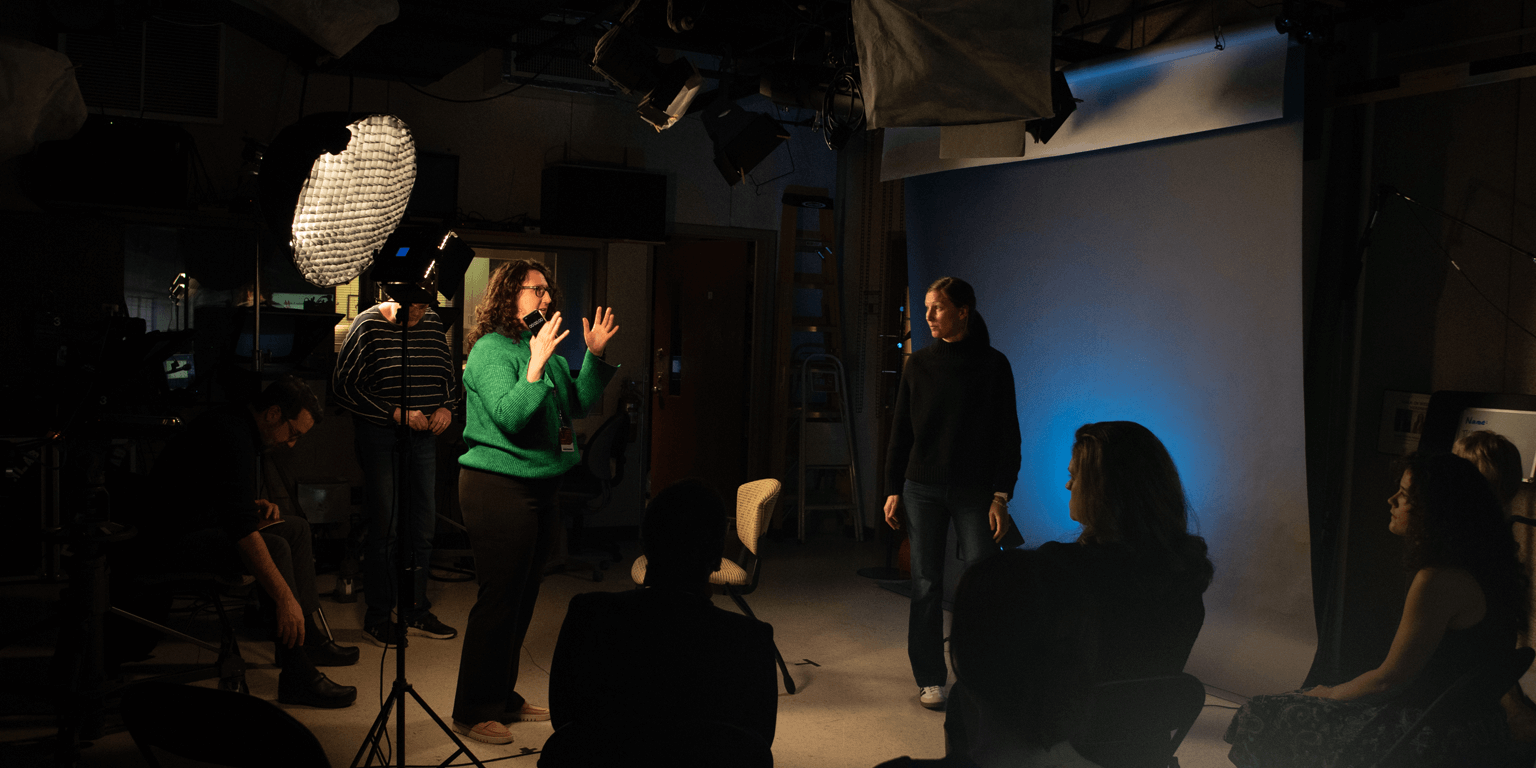
Q and A with Dr. Krista Longtin
I have always been interested in stories and storytelling, particularly how people use stories to make sense of their experiences and connect to others. I’ve been a faculty member on the IUPUI campus since 2002, originally teaching courses in public speaking and media studies. I started working in the IU School of Medicine in 2010, and after finishing my Ph.D. in 2014, my career shifted to focus on how to teach faculty and learners in science and the health professions to communicate more effectively.
In my work, we’ve found that techniques from improvisational theatre, sometimes called “applied improv,” can build empathy and trust quickly, even among people from very different backgrounds. Focusing on stories is the key to success—whether it’s sharing the unique experience of a patient living with cancer or a scientist who overcame hardships in her lab to make a discovery.
Communication is a fundamental part of the human experience and a critical element of the scientific process. We’ve learned so much in the past 50 years about how to communicate effectively, especially in science and health, but we’ve struggled to get that new knowledge into education programs. My research seeks to answer the questions: what is the best way to train experts on how to talk about science and health? And, how can we revise curriculum to teach physicians, scientists, and healthcare providers to communicate most effectively to non-experts, including patients, children, and policymakers?
I’m proud to have worked with multiple community organizations to improve science and health communication. For example, I worked with the Evangelical Community Church in Bloomington and the Center for Interfaith Cooperation to hold community conversations about the shared values between science and faith. Each year, the Communicating Science graduate minor program and workshop series trains hundreds of students and faculty on what works in communication strategies. We actively seek to upend the “deficit model” of science communication, a misconception that just simply giving more information will change decision-making behavior. Rather than just sharing information, physicians and scientists must be engaged in helping their patients and community members see themselves as collaborators in sharing information and making decisions. By dispelling this myth and teaching collaborative communication, we help regular Indiana people make better decisions about health and science every day.
There's a saying in improv, “Bring a brick, not a cathedral.” When we enter a conversation committed to a fully-formed idea (a cathedral), we are less open to collaboration and connection. When we can slow down, listen, and offer something small (a brick), then piece-by-piece we can create something that is much greater than an idea from one person alone. So, my favorite part of my research is “bringing bricks,” collaborating with colleagues, students, and community members to answer interesting questions and solve problems. My ideas are always much better in collaboration with others.
Students are critical to the success of my research in science and health communication. First, students are the primary audience for our training programs in communicating science. I’m working with faculty in the IU School of Medicine right now to ensure that our patient-provider communication curriculum is using the most current research around important public health issues, like vaccine hesitancy. Second, I often collaborate with medical students, residents, and graduate students on my research projects themselves. For example, three of my students—two from the Communicating Science minor and one from the Health Communication Ph.D. program—were selected as finalists for a national award from the American Association for the Advancement of Science for their research on how scientists and physicians reconceptualized their definitions of uncertainty after the pandemic.
Recently, in a project with Indiana Humanities and Indiana Sciences, we developed an evaluation program for a science outreach activity called, “Books, Booze, and Brains.” I served as a facilitator for this creative program that brings together scientists and the community for book club-style conversations in local pubs.
Rather than evaluate the program with a traditional survey, we engaged participants, asking them what they wanted to know about the program and its effectiveness. Then, we used quiz questions, asking participants to put poker chips in buckets at the end of each event.
It seemed like a small shift, but just like the tip jars at your local coffee shop that say, “Do you like kittens or puppies?,” these participatory methods encourage engagement and help participants feel less removed from the research process.
Next, I’m looking forward to working with a team of collaborators nationally to develop communication competencies for graduate students in biomedical science and medicine. Led by Research!America, a nonprofit organization dedicated to promoting scientific research, a team of faculty including myself will be developing policy statements to require all students studying in science and the health professions to have a course in communicating science. Given the proliferation of mis- and dis-information in the U.S., we believe these mandates will improve public policy, so new laws are not based on feelings and beliefs, but instead informed by rigorous and ethical scientific research.
Conversation with Dr. Krista Longtin
On Friday, May 31, 2024. from 12 noon to 1 p.m., Dr. Krista Longtin will talk about “Improv(ing) Communication About Science and Health: How Theatre Can Help Experts Connect and Collaborate with the Community.”
Communicating about science and health in the current landscape is challenging. Scientists and healthcare professionals must establish trust and credibility quickly with the general public, sometimes in a Tweet or short interaction. New research indicates that participatory and experiential techniques, like those from applied improvisational theatre, may be the key to teaching these complex communication skills.
Dr. Krista Longtin, associate professor of obstetrics and gynecology and communication studies, will explore these new teaching techniques, helping physicians and scientists to learn to embody empathy, fostering deeper connections with patients, colleagues, and stakeholders. By embracing spontaneity and active listening, they cultivate an environment of trust and openness, essential for effective collaboration and patient care. Drawing parallels between improv principles and real-world interactions, attendees will gain practical strategies to navigate complex conversations with authenticity and compassion. Join us to get the tools to communicate empathetically, enhance policy decisions, patient outcomes, and professional relationships.
Interested in Becoming an IUPUI TRIP Scholar?
Eligibility
IUPUI faculty member conducting translational community-based research
Benefits
- Valued member of an extensive network of researchers/collaborators
- Opportunities to showcase work
Subscribe to the TRIP Scholars of the Month

